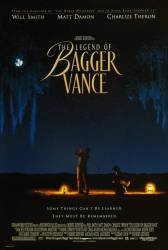Factual error: While on the final hole, last round, the camera pans in on one of the men "inside the ropes" with the three golfers. He is wearing glasses, and they contain a greenish reflection of the late afternoon sun. This colored reflection is due to a modern anti-reflective coating put on lenses today to prevent annoying reflective glare. These coatings weren't available until the 1980's and in wide use until the 90's. (00:00:05)
Factual error: In the scene when it is raining, Will Smith is sitting by a shed and the kid is under a tree. The John Deere tractor in the shed has a seat with a backrest on it. This kind of seat was not used on a tractor until the 1950s. (00:44:10)
Factual error: When the second round of the tournament is starting and Bagger Vance is telling Rannulph Junuh about 'the field', just after Bobby Jones has taken his tee-shot, Bagger hands Junuh a ball and tee. The tee is a red plastic 'castle' style tee. Apart from being illegal in tournament play, I'm pretty sure they weren't around in the 1920's.
Factual error: On the final hole of play, Damon should have placed his ball back to its original position and taken a one stroke penalty. He did not replace the ball to its original penalty, so he would have been deemed to playing the ball from the wrong position, which is another penalty stroke.
Factual error: At the end the narrator says Walter Hagen only played exhibition matches. This is untrue. He played on for years and won several PGA events in the 30s.
Factual error: In the last round of play, Walter Hagen is surrounded by water and asks his caddy for a cigarette. He then tries to light it several times with an automatic "click" lighter. The automatic lighters in the 1920s did not click.






Answer: There are many reasons that known actors appear in movies and are uncredited. Cameo appearances often go un-credited. Actors sometimes do a cameo if they are friends with the director or the other stars. It can add an unexpected surprise for the audience. There are also contract and payment issues if an actor receives billing in the credit. Jack Lemmon, who was the narrator for the story, may have preferred not being credited. He was certainly a big enough star that if he wanted to be listed in the credits, he would have received proper billing.
raywest ★